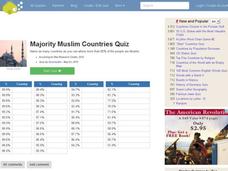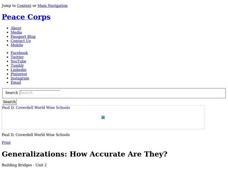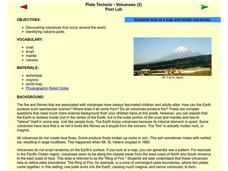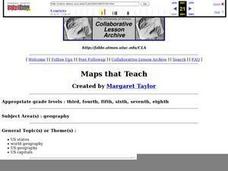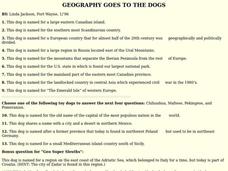Curated OER
The Persian Empire
For this the Persian empire worksheet, students read a two page passage about Persia, then answer 5 multiple choice and 7 short answer questions requiring research about the topic.
Curated OER
Majority Muslim Countries Quiz
In this online interactive geography quiz worksheet, students respond to 47 identification questions about Muslim cities. Students have 4 minutes to complete the quiz.
Curated OER
Traveling Through North America
Students identify places and landmarks in North America, specifically Canada and the United States, by using and constructing maps. Six lessons on one page; includes test.
Curated OER
Generalizations: How Accurate Are They?
High schoolers recognize and modify generalizations. They challenge generalizations made about people, insist on knowing the evidence that supports these, and be willing to modify their own generalizations when confronted by evidence...
Curated OER
Is Coming to the United States of America Good for the Immigrant?
Student discuss whether coming to the United States was good for certain groups of immigrants. Using the internet, they examine settlement patterns for immigrants over a period of time. In groups, they role play the role of a family...
Curated OER
Sports Franchises: The Demographic Dimension
Students examine how U.S. population patterns have changed over time. Using the growth of major league baseball to illustrate these patterns, students create maps, examine regional migration patterns, and make predictions for the future.
Curated OER
Ramadan (Islamic Holiday)
Students recognize that different groups of people have celebrations unique to them. They identify countries on a map where Islam is a dominant religion. They demonstrate their understanding of fasting and abstinence.
Curated OER
Plate Tectonic - Volcanoes Post Lab
Second graders discover volcanoes that occur around the world. They identifying volcano parts.
Curated OER
Wolves: DNA Pawprinting
Learners explore and research the most widely distributed terrestrial carnivore, the wolf. They critique the true mystery of this animal and then form an opinion about this creature. The restriction-site analysis of mitochondrial DNA is...
Curated OER
The Historical Geography of Mesopotamia
Students show how the geography of the Mesopotamia region has impacted the beginnings of civilization. They show how this area has long been the site of the rise and fall of great empires, and how the geography of this region has a lot...
Curated OER
History and Government of the United States
In this U.S. worksheet, learners take notes in a graphic organizer as they read several passages, then answer four comprehension questions.
Curated OER
Youth and Old Age
In this youth and old age dictation worksheet, students take dictation on a passage containing various terms associated with youth and old age.
Curated OER
Reading Comprehension Exercise
In this reading comprehension instructional activity, students read paragraphs and fill in the blanks with words given and correct mistakes. Students complete 2 activities.
Curated OER
Classroom Guide for Coming to America
Learners discuss the pre-reading focus questions. In this reading lesson, students discuss and explore the book cover and title. Learners predict what they will learn from this book. Additionally, students read to find out what life is...
Curated OER
Henry Hudson: 400th Anniversary of Discovery
Commemorate the discovery made by Henry Hudson and delve into the Age of Exploration.
Curated OER
Be A Food Explorer
Young scholars read about and discuss the origin of many different fruits and vegetables. Students complete surveys, sample a variety of new foods and write about their reactions. They commit to trying at least three new foods.
Curated OER
Maps that Teach
Young scholars study maps to locate the states and capital on the US map. Students locate continents, major world physical features and historical monuments. Young scholars locate the provinces and territories of Canada.
Curated OER
Identifying Continents and Oceans
Learners locate and identify the four major oceans and the seven continents on a world map. They use an unlabeled world map and compass rose to describe relative locations of the continents and oceans.
Curated OER
Landforms All Around
Students create a "Landform Dictionary". They develop an overlay map and participate in hands-on activities to identify the key characteristics of landforms. They discuss the plant and animal life of these areas. Handouts for the lessons...
Curated OER
Contemporary Immigration Lesson Plan
Students research contemporary immigrations of Africans to the United States. They investigate the laws and regulations of immigration and the impact of immigration on the nation.
Curated OER
GEOGRAPHY GOES TO THE DOGS
Students use countries and dogs from around the world to answer the questions.
Curated OER
Antarctica Vocabulary Quiz
In this Antarctica vocabulary worksheet, learners match vocabulary words about Antarctica with definitions, 15 words total. Worksheet contains a link to additional activities. Labeled as a quiz, but may be used for practice or review.
Curated OER
Learning from history: can it save lives?
Young scholars research and document lessons learned from this disaster, then compile and synthesize information. They write effectively for public education purposes and use visual communications tools
Other popular searches
- South East Asia Geography
- Climate South East Asia
- Modern South East Asia
- South East Asia Population
- South East Asia Imperialism
- Maps South East Asia
- South East Asian Culture
- Tsunami South East Asia
- South East Asia Monsoons
- South/east Asia Map



